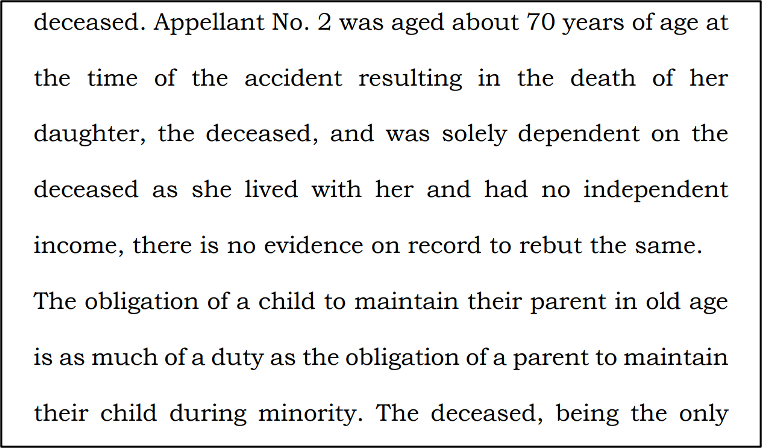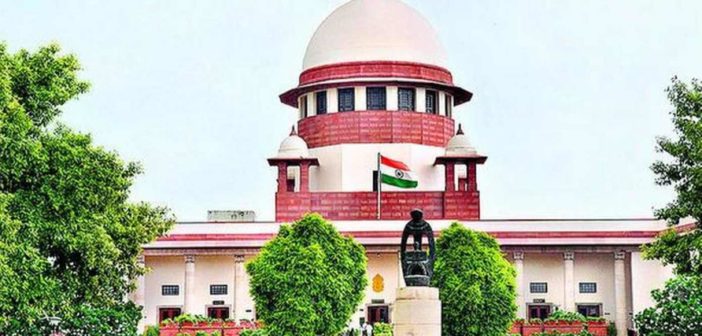In this edition of the review of court judgments, we look at Himachal Pradesh HC’s order that marital rape exception doesn’t apply to Section 377-unnatural offences, SC’s order that non-public servants can be convicted for abetment under Prevention of Corruption Act, Karnataka HC’s order that assessment of suitability must not be based solely on the medical certificate, but also on the functional assessment of the PwD candidate, among others.
Himachal Pradesh HC: Marital rape exception doesn’t apply to Section 377-unnatural offences
In the case, Rajesh Kumar vs. State of Himachal Pradesh, the petitioner sought quashing of an FIR registered in 2022 in Mandi district, Himachal Pradesh, under Sections 377, 498A, 323, 355, 504, 506, and 34 of the IPC, following a complaint filed by his wife. These sections deal with cruelty towards the wife, physical assault, threats, and a serious charge of unnatural sexual acts.
He argued that the matter had been amicably resolved with the intervention of community elders, and the complainant no longer wished to pursue the case. The complainant confirmed her willingness to withdraw the case and stated that she was now residing peacefully with the petitioner. Further, during the hearing, the petitioner’s counsel contended that Section 377 (unnatural sexual offences) cannot apply to a husband-wife relationship and relied on a 2024 Uttarakhand High Court judgment. He also argued that post the Supreme Court’s ruling in Navtej Singh Johar vs. Union of India (2018), Section 377 was largely unconstitutional.
But the Himachal Pradesh High Court bench of Justice Rakesh Kainthla disagreed with the contention using Uttarakhand High Court’s judgement stating that the reasoning used by the Uttarakhand court amounted to “judicial legislation”, which means creating or changing the law through interpretation rather than following what the law actually says. The Court also clarified that the Navtej Singh Johar ruling only decriminalised consensual sexual acts between adults. It did not affect cases involving non-consensual acts, which remain punishable.
The court observed that Section 377 is a serious offence against society and cannot be settled privately. Further, it added that like rape (Section 376 IPC), non-consensual acts under Section 377 are also grave and non-compoundable and so, it could not be quashed even with mutual consent.
Ultimately, the Himachal Pradesh High Court partly allowed the petition, quashing the FIR only in respect of compoundable offences under Sections 498A, 323, 355, 504, 506, and 34 IPC. The proceedings under Section 377 IPC will continue.
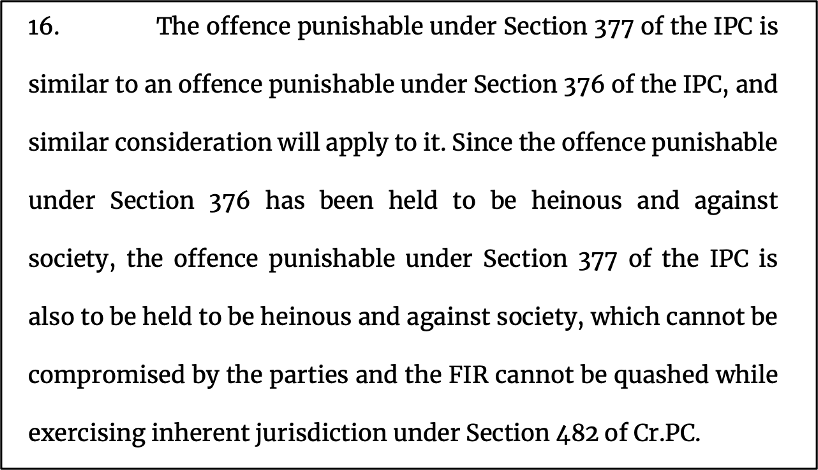
Delhi HC: A parent who has custody of a child may have to leave their job, not by choice, but because caring for the child is their first responsibility.
The petitioner-husband in Praveen Kumar vs. Pooja Arya filed a revision petition against the Family Court’s order dated 21 October 2023, which directed him to pay interim maintenance to his wife (the respondent) and their six-year-old child. The parties married in January 2016 but have been living separately since July 2017. The wife alleged cruelty and harassment by the husband. She was previously employed as a guest teacher, earning about Rs. 30,000 monthly, but became unemployed in December 2022 after her contract ended. The Family Court awarded interim maintenance of Rs. 7,500 each for the wife and child from January 2023 onwards, considering the wife’s unemployment and the husband’s notional income.
The petitioner argued that the wife’s maintenance claim was an abuse of process aimed at harassing him. He claimed his monthly income was only Rs. 10,000 to Rs. 15,000, supporting his elderly mother, while his wife was financially better off and capable of earning. He also highlighted that the wife left the matrimonial home voluntarily and did not comply with earlier court orders to return. The petitioner contended that the maintenance amount was excessive and unfair given his financial difficulties. The wife’s counsel, conversely, stated the petitioner was financially stable with a flourishing legal practice and rental income, and had concealed his true earnings. The wife’s discontinuation from work was due to caregiving duties for the minor child and lack of nearby employment.
Justice Swarana Kanta Sharma of the Delhi High Court recognised that caregiving responsibilities justified the wife’s unemployment and held that actual income, not mere earning capacity, governs maintenance entitlement. The Family Court’s assessment of the petitioner’s notional income at Rs. 30,000 was reasonable given the lack of credible income disclosure. However, the Court noted the Family Court had not adequately scrutinised the income affidavits and bank statements of both parties before fixing maintenance.
The High Court upheld the interim maintenance order but remanded the case to the Family Court to reconsider maintenance afresh after properly examining financial disclosures from both parties. Meanwhile, the petitioner was directed to continue paying Rs. 7,500 to the wife and Rs. 4,500 to the child monthly until further orders.
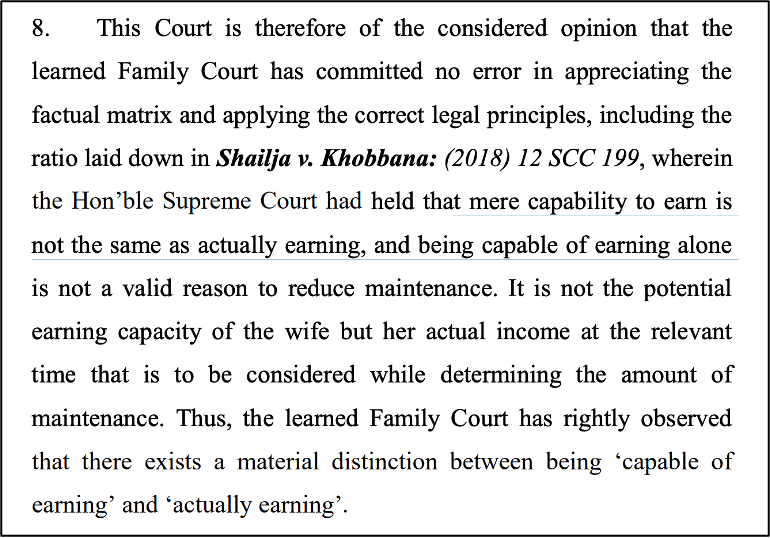
SC: Non-public servants can be convicted for abetment under Prevention of Corruption Act
The appellant in P. Shanthi Pugazhenthi vs. State, was an Assistant Superintendent at Chennai Port Trust. She challenged her conviction under Section 109 IPC read with Sections 13(2) and 13(1)(e) of the Prevention of Corruption Act, 1988. Her then-husband, a Divisional Manager at United India Insurance Co. Ltd., was the primary accused in a disproportionate assets case. While investigating a bribery FIR against him, a subsequent FIR was registered in 2009 under the Prevention of Corruption Act for possessing assets exceeding known income. Raids led to the discovery of numerous properties in both his and the appellant’s name. The charge sheet alleged that the couple amassed assets worth Rs. 60.99 lakhs during 2002–2009, of which Rs. 37.98 lakhs were found to be disproportionate.
The Trial Court in 2013 convicted both the husband under the Corruption Act and the appellant for abetment. The High Court upheld the convictions in 2018, observing that explanations for the assets did not account for the excess, and the appellant had actively participated in concealing ill-gotten wealth.
The appellant argued that assets in her name could not be held disproportionate in her hands, and she could not be held liable for her husband’s actions. She also stated they were no longer married. The prosecution maintained she knowingly helped conceal the assets.
Relying on P. Nallammal vs. State (1999), the Supreme Court bench of Justices Sudhanshu Dhulia and K. Vinod Chandran reaffirmed that even non-public servants can abet offences under Section 13(1)(e). They observed that the appellant had allowed the co-accused to accumulate assets in her name and thus, assisted the co-accused, her then husband, in the accumulation of assets disproportionate to the known sources of income. The Court thus found the appellant complicit. Her public servant status at the time further reinforced her liability. The Court dismissed the appeal and directed her to surrender within four weeks.
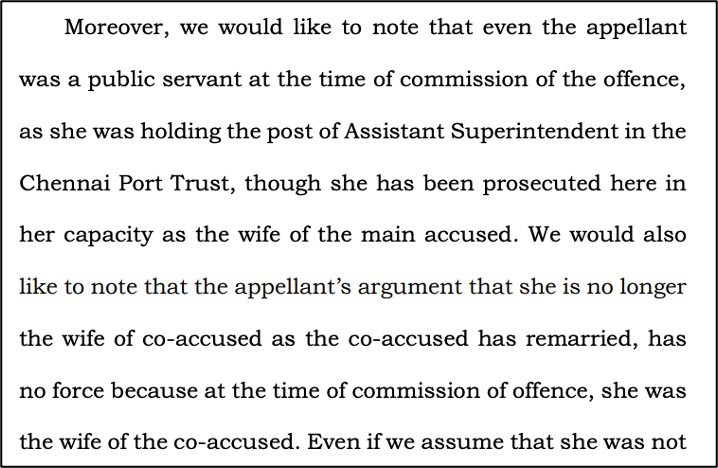
Karnataka HC: Assessment of suitability must not be based solely on the medical certificate, but also on the functional assessment of the PwD candidate
In the case, Anil Kumar vs. Karnataka Power Transmission Corporation Limited, the appellant is a person with locomotor disability affecting both arms and legs. He challenged the rejection of his candidature for the post of Assistant Accounts Officer (AAO) under the Persons with Disabilities (PwD) quota, following the 2016 recruitment notification issued by the respondent company. The appellant was already working as an Assistant in the same organisation, having been appointed under the 2015 notification, which had broader eligibility criteria.
The appellant contended that since he was already performing similar duties as an Assistant and was eligible for promotion to AAO, he should not be disqualified from direct recruitment merely on the basis of updated eligibility criteria. He relied on a Supreme Court judgment, arguing that functional assessment and not just medical categorisation should determine suitability. He also argued that in the absence of any other eligible PwD candidate, the criteria should be relaxed. The respondents maintained that the 2016 notification strictly limited eligibility to disabilities affecting only one arm or leg, which the appellant did not satisfy. They argued that eligibility conditions were mandatory and non-negotiable.
The Single Judge had dismissed the appellant’s writ petition, holding that he did not satisfy the eligibility criteria under the 2016 notification, and that such criteria could not be relaxed. However, the Division Bench of Chief Justice N V Anjaria and Justice K V Aravind emphasised that functional assessment, not just medical classification, is the key determinant in evaluating the suitability of a PwD candidate. The appellant’s disability certificate confirmed that he could perform light duties using both hands.
It noted that the duties of an Assistant and AAO are substantially similar, and that the appellant was eligible for promotion to AAO. The Court also relied on the Supreme Court’s rights-based approach in Recruitment of Visually Impaired in Judicial Services, holding that strict adherence to medical criteria may be relaxed where no other eligible PwD candidates are available, provided the candidate is functionally capable.
The Court allowed the writ appeal and declared the appellant eligible for the AAO post under the PwD quota. It directed his appointment with notional seniority to be completed within eight weeks.
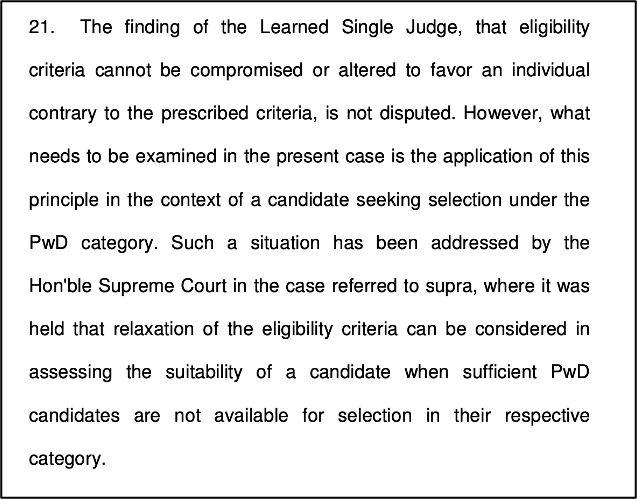
SC: Once a daughter is married, logical presumption is that she now has rights on her matrimonial household and is financially supported by her husband
This case, Deepsikha vs. National Insurance Company Ltd. involved a tragic road accident in Jaipur on 26 January 2008, when Paras Sharma was hit by a state-run bus while riding her two-wheeler. She died on the spot after being run over by the bus, which had taken a sudden right turn negligently. Her mother and married daughter filed a compensation claim under the Motor Vehicles Act, asking for over Rs. 54 lakh.
The Motor Accident Claims Tribunal found the driver, owner, and insurance company responsible and awarded Rs. 15.97 lakh in compensation. The Tribunal noted that both the mother and daughter were legal heirs and somewhat dependent on the deceased.
However, when the case went to the Rajasthan High Court, the compensation was sharply reduced. The Court gave only Rs. 50,000 to the daughter and rejected the mother’s claim entirely, stating that neither could be considered dependents. It relied on an earlier Supreme Court ruling which said legal heirs could claim compensation only if they were financially dependent on the deceased. The mother and daughter then approached the Supreme Court.
The Supreme Court agreed with the High Court that the married daughter had not proved financial dependence on her mother, and therefore, could only get the fixed amount under Section 140 of the Act. But the Court disagreed with the High Court’s rejection of the mother’s claim. It found that the 70-year-old mother had lived with and relied on her daughter for support. The Court emphasised the duty of children to care for aging parents and held that the mother was indeed a dependent. The Court revised the compensation to Rs. 19.22 lakh in her favour and restored her claim. The daughter’s award remained unchanged. The appeal was thus partly allowed.
